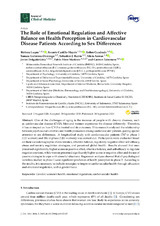The Role of Emotional Regulation and Affective Balance on Health Perception in Cardiovascular Disease Patients According to Sex Differences
Autor
Luque Salas, Bárbara
Castillo Mayén, Mª del Rosario
Cuadrado, Esther
Gutiérrez Domingo, Tamara
Rubio García, Sebastián
Arenas Moreno, Alicia
Delgado-Lista, Javier
Pérez-Martínez, Pablo
Tabernero Urbieta, Carmen
Editor
MDPIFecha
2020Materia
GenderWomen’s health
Emotional regulation
Cardiovascular health
METS:
Mostrar el registro METSPREMIS:
Mostrar el registro PREMISMetadatos
Mostrar el registro completo del ítemResumen
One of the challenges of aging is the increase of people with chronic diseases, such as cardiovascular disease (CVD). Men and women experience the disease differently. Therefore, it has an impact on how CVD is treated and its outcomes. This research analyzed the relationship between psychosocial variables and health promotion among cardiovascular patients, paying special attention to sex differences. A longitudinal study with cardiovascular patients (747 in phase 1 (122 women) and 586 in phase 2 (83 women)) was carried out. Participants were evaluated based on their sociodemographic characteristics, affective balance, regulatory negative affect self-efficacy, stress and anxiety regulation strategies, and perceived global health. Results showed that men presented significantly higher scores in positive affect, affective balance, and self-efficacy to regulate negative emotions, while women presented significantly higher scores in negative affect and the use of passive strategies to cope with stressful situations. Regression analyses showed that all psychological variables studied in phase 1 were significant predictors of health perception in phase 2. According to the results, it is necessary to include strategies to improve cardiovascular health through education and emotional regulation, with a gender focus.

